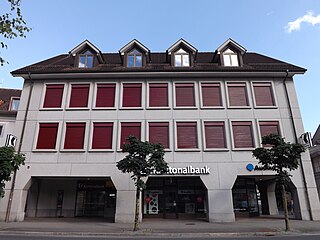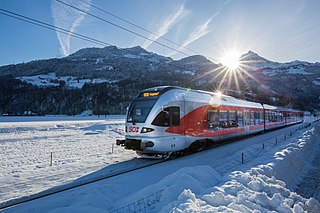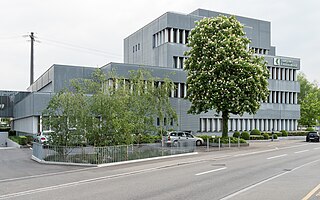
The Tödi, is a mountain massif and with the mountain peak Piz Russein the highest mountain in the Glarus Alps and the highest summit in the canton of Glarus, Switzerland. It is located on the border between the cantons of Graubünden, to the south, and Glarus, to the north, close to the point where those two cantons meet the canton of Uri, to the west. Although not the culminating point of Graubünden, it is its highest peak outside the Bernina range.

The 26 cantons of Switzerland are the member states of the Swiss Confederation. The nucleus of the Swiss Confederacy in the form of the first three confederate allies used to be referred to as the Waldstätte. Two important periods in the development of the Old Swiss Confederacy are summarized by the terms Acht Orte and Dreizehn Orte.

The Council of States is the upper house of the Federal Assembly of Switzerland, and the lower house being the National Council. It comprises 46 members.

Glarus is the capital of the canton of Glarus in Switzerland. Since 1 January 2011, the municipality of Glarus incorporates the former municipalities of Ennenda, Netstal and Riedern.

The Landsgemeinde is a public, non-secret ballot voting system operating by majority rule. Still in use – in a few places – at the subnational political level in Switzerland, it was formerly practiced in eight cantons. For practical reasons, the Landsgemeinde has been abolished at the cantonal level in all but two cantons where it still holds the highest political authority: Appenzell Innerrhoden and Glarus. The Landsgemeinde is also convened in some districts of Appenzell Innerrhoden, Grisons and Schwyz to vote on local questions.
Hans Kaufmann is a Swiss politician and business consultant. He was a member of the Swiss National Council from 1999 to 2014.

The Glarner Sprinter was a named passenger train of the Swiss Federal Railways (SBB). It ran from Zurich into the canton of Glarus, and was operated as a RegioExpress service. The train provided a commuter service for passengers travelling from the towns and villages of Glarus to the greater Zurich region, whilst also providing a tourist connection in the opposite direction. In July 2014 it was replaced by a more frequent service as part of the Zürich S-Bahn, the S25.
Ralph Lewin is a Swiss politician and the former member of the Government Council of the Canton of Basel-City from 1997 to 2008. From 2010 to 2017, Lewin served on the board of directors for Bank Coop and in the Bank Council of its majority owner Basler Kantonalbank. He is a member of the Social Democratic Party of Switzerland. Since 2020 he is president of the Swiss Federation of Jewish Communities.

Zurich Cantonal Bank is the largest cantonal bank and fourth largest bank in Switzerland, with total assets of over CHF 150 billion.

The S25 is a regional railway line of the S-Bahn Zürich on the Zürcher Verkehrsverbund (ZVV), Zürich transportation network, and is one of the network's lines connecting the cantons of Zürich with Schwyz, Glarus and St. Gallen. The line was introduced in July 2014, and replaces the less frequent Glarner Sprinter train.
Basler Kantonalbank is a Swiss cantonal bank, one of the 24 cantonal banks serving Switzerland's 26 cantons, founded in 1899. In 2019, Basler Kantonalbank had 15 branches with 842 total employees; the total assets of the bank were CHF 27.305 billion. Basler Kantonalbank has a full state guarantee of its liabilities.
The Berner Kantonalbank AG, operating under the brand name "BEKB | BCBE" and based in the Swiss canton of Bern, is a public limited company under private law founded in 1834 as one of the first cantonal banks of its kind, serving Switzerland's 26 cantons. At the end of 2020, the total financial assets of BEKB were valued at 36.4 billion Swiss francs with their staff comprising approximately 1,230 employees.

Martin Landolt is a Swiss politician and member of the Swiss National Council for the Conservative Democratic Party of Switzerland (BDP). From May 2012 to December 2020, he served as the President of the BDP.

The Urner Kantonalbank is the cantonal bank of the Canton of Uri, having its seat in Altdorf. It was founded in 1915 and is organized as a public-law institution. The bank is the market leader in the Canton of Uri operating ten offices, other than its headquarters. Urner Kantonalbank had 103 employees and total assets of 3.05 billion Swiss francs at the end of 2016.
Martin Ebner is a Swiss billionaire businessman and investor from the municipality of Freienbach in the canton of Schwyz. He is the founder of BZ Bank, and the investment firm, BZ Group. Through his investment vehicle Patinex, he owns multimillion-dollar stakes in various companies, and his biggest holdings include healthcare company Vifor Pharma, software firm Temenos AG, and real estate investor Intershop.

The Ziegelbrücke–Linthal railway, is a single-track standard-gauge line in the Swiss cantons of Glarus and St. Gallen, connecting Ziegelbrücke with Linthal.

The S6 is a railway service of the St. Gallen S-Bahn that provides hourly service between Rapperswil and Schwanden, in the cantons of St. Gallen and Glarus. A limited number of trains continue from Schwanden to Linthal. Südostbahn, a private company primarily owned by the federal government and the canton of St. Gallen, operates the service.

Thurgauer Kantonalbank is a Swiss cantonal bank serving the canton of Thurgau. The head office is based in Weinfelden.
Schaffhauser Kantonalbank is a Swiss cantonal bank that serves and is based in Schaffhausen. It is wholly owned by the Swiss Canton of Schaffhausen and serves the area with six branches and ten ATMs. The bank offers both public and commercial banking services including savings, cards, real estate and investments.
Benjamin Mühlemann is a Swiss politician. He is a member of the FDP.











